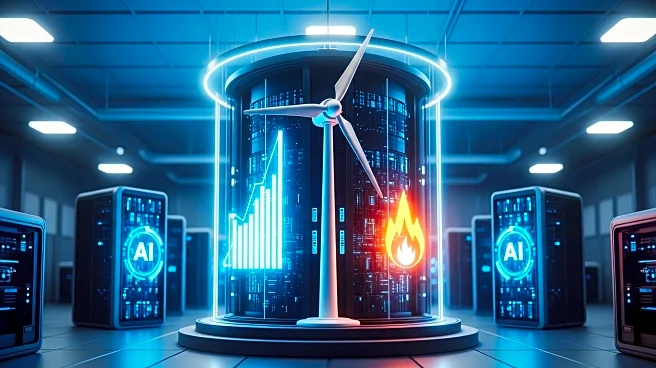What's Happening?
In Texas, new projects are underway to develop power plants that integrate natural gas, renewable energy, and artificial intelligence (AI) to support next-generation data centers. These initiatives are part of a broader trend in the manufacturing sector, where AI is increasingly being used to enhance efficiency and reduce downtime. Murali Sastry, senior VP and head of technology at Skillsoft, highlights the potential of AI systems like vibe coding and agentic systems to significantly cut automotive assembly downtime, potentially saving hundreds of millions of dollars annually. Additionally, ReilAI CEO and Co-Founder Joanne Friedman discusses the dilemma manufacturers face regarding the level of autonomy to grant AI systems, noting that while AI can respond quickly to emergencies, it may lack accountability and deviate from its intended purpose.
Why It's Important?
The integration of AI with natural gas and renewable energy in Texas data centers represents a significant shift in how energy and technology sectors collaborate. This development could lead to more sustainable and efficient data center operations, reducing environmental impact while enhancing technological capabilities. The potential savings in automotive assembly downtime underscore the economic benefits of AI adoption in manufacturing, which could lead to increased competitiveness and innovation in the industry. However, the question of AI autonomy raises concerns about accountability and control, which are crucial for ensuring that AI systems align with human objectives and ethical standards.
What's Next?
As these projects progress, stakeholders in the energy and technology sectors will likely monitor the outcomes closely to assess the viability and scalability of such integrations. Manufacturers may need to establish guidelines and frameworks to manage AI autonomy effectively, balancing innovation with ethical considerations. The success of these initiatives could prompt further investments in AI-driven solutions across various industries, potentially reshaping the landscape of manufacturing and energy management.
Beyond the Headlines
The ethical implications of granting AI systems significant autonomy are profound, as they challenge traditional notions of accountability and control in manufacturing processes. This development could lead to a reevaluation of industry standards and practices, necessitating new regulatory frameworks to ensure responsible AI usage. Additionally, the environmental benefits of integrating renewables with AI-driven data centers could contribute to broader efforts to combat climate change and promote sustainable energy solutions.









